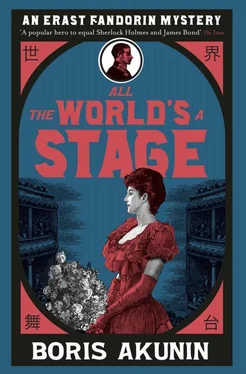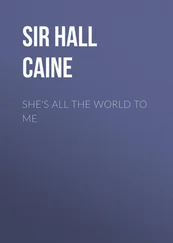This device, which had outraged the author of the newspaper article so profoundly, had seemed ingenious to Fandorin. Firstly, it meant that Stern sold even the very cheapest seats for five roubles each (as much as the price of a good seat in the orchestra stalls in the Bolshoi Theatre). Secondly, the entire student community of Moscow was all agog over Noah’s Ark. Thirdly, a lot of young people came to see the show, and it is their enthusiasm that contributes most to ensuring a theatre’s success.
Without even condescending to answer the ticket tout, sullen Erast Petrovich made his way over to a door with a plaque that said ‘House Manager’. If Fandorin had needed to collect his pass inside, he would have turned round and walked away. Nothing could have induced him to squeeze his way through between so many backs and shoulders. But Olga Leonardovna had told him: ‘Five paces to the right of the door there will be a man with a green briefcase, standing on the steps…’
And indeed, standing precisely five paces away from the crowd that was storming the door, lounging back against the wall, was a tall man with broad shoulders, wearing a striped American suit that contrasted rather noticeably with his coarse face, which seemed to be moulded out of reddish-brown clay. The man was simply standing there quite impassively, without even glancing at the clamouring votaries of Melpomene, and whistling; he had a flirtatious little green briefcase pressed against his side with his elbow.
Fandorin was not able to approach the striped gentleman immediately – someone was constantly pushing through to the front. In some elusive way these people resembled the rogue who had tried to fleece Erast Petrovich of twenty-five roubles for a ticket; equally shifty and shadowlike, with rapid, muted speech.
The owner of the green briefcase disposed of them quickly, without saying a single word – he just whistled: briefly and mockingly to some, after which the individuals concerned immediately disappeared; menacingly to some, who backed away; and approvingly to others.
The touts’ and hucksters’ handler , Fandorin decided. Finally wearying of listening to the artistic whistling and observing the incessant flickering of shadowy figures, he set one foot on the first step, holding back by the shoulder yet another shadow that had bobbed up out of nowhere, and said what he had been instructed to say.
‘From Madam Knipper.’
The whistler had no chance to respond. Yet another third party pushed in between him and Fandorin. Erast Petrovich did not grab this one by the shoulder, or any other part of his body, out of respect for his uniform: he was an officer, a cornet of hussars and a guardsman to boot.
‘Sila Yegorovich, I implore you!’ the young man exclaimed, gazing at the striped gentleman with absolutely wild, staring eyes. ‘For the orchestra stalls! No farther than the sixth row! Your men have gone totally insane, they’re asking twenty roubles a time. All right, then, but on credit. I spent everything I had on a basket of flowers. You know that Vladimir Limbach always pays up. So help me, I swear I’ll shoot myself!’
The scalper gave the desperate cornet an indolent glance and whistled indifferently.
‘There aren’t any tickets. They’ve run out. I can give you a complimentary pass without a seat, seeing as I’m so well disposed.’
‘Ah, but you know an officer can’t watch a performance without a seat.’
‘Well, take it or leave it… Just one moment, sir.’
The last few words were addressed to Erast Petrovich, together with a polite smile, which required a serious effort from that physiognomy of clay.
‘There, if you please. A pass for box number four. My respects to Olga Leonardovna. Always glad to be of service.’
Fandorin set off towards the main entrance, to the accompaniment of benign whistling from the tout and an envious glance from the hussar.
‘All right, give me the complimentary pass at least!’ a voice behind him exclaimed.
Box number four turned out to be the finest of them all. If this had been an imperial theatre, and not a private one, it would probably have been called ‘the royal box’. The seven armchairs with gilded backs – three in the first row and four in the second – were all entirely at the disposal of a single spectator. All the more impressive, therefore, was the contrast with the rest of the auditorium, which was literally too cramped for an apple to fall to the floor. There were still five minutes left until the beginning of the performance, but the audience were all in their seats already, as if every one of them feared that another claimant to the same place might show up. And not without reason: in two or three places ushers were trying to calm down agitated people who were brandishing tickets. One scene was played out immediately below Fandorin’s box. A well-fleshed lady in an ermine boa almost wept as she exclaimed:
‘What do you mean, counterfeit? Where did you buy these tickets, Jacquot?’
Red-faced Jacquot babbled that he got them from an extremely presentable gentleman, for fifteen roubles. The attendants, accustomed to such occurrences, were already carrying over two additional chairs.
In the tiered stalls they were sitting even more tightly packed, with some people even standing in the aisles. The area was dominated by the young faces of male students in pea jackets and female students in white blouses.
At precisely eight o’clock, immediately after the third bell, the lights in the auditorium went out and the doors were firmly closed. The rule of starting a performance on time and not admitting anyone who came late had been introduced by the Art Theatre, but even there it was not observed with such meticulous strictness.
Erast Petrovich heard a creak behind him.
Turning round on the central armchair of the front row, where he was perched like a Padishah, he was rather surprised to see the hussar who had recently promised to shoot himself.
Cornet Limbach – Fandorin thought that was his name – whispered:
‘Are you alone? Excellent! Don’t object if I take a seat, do you? Why would you need so many places?’
Fandorin shrugged as if to say: By all means, I can spare one. He moved one seat to the right, so that they would not be crowded together. However, the officer preferred to seat himself behind Fandorin’s back.
‘It’s all right, I’ll sit here,’ the cornet said, taking a pair of field glasses out of their case.
The door of the box creaked again.
‘Damn him, what’s he doing here? Don’t give me away, I’m with you!’ the cornet whispered under his breath into Fandorin’s ear.
A middle-aged man in tails and a starched shirt walked in, wearing a tie exactly like Erast Petrovich’s, only the pearl in it was not black, but grey. A banker or successful barrister , Fandorin speculated, casting a brief glance at the pampered beard and the triumphantly gleaming bald cranium.
The man who had walked in bowed urbanely.
‘Tsarkov. And you are the incomparable Olga Leonardovna’s acquaintance. Always glad to be of service…’
From these words it was possible to conclude that Mr Tsarkov was the owner of the miraculous box and he had been asked to provide a seat by the actress. It was not entirely clear what part in all this was played by the whistler with the green briefcase, but Erast Petrovich had no intention of racking his brains over that.
‘Is the young man with you?’ the amiable owner enquired, squinting sideways at the cornet (who was studying the decorative moulding on the ceiling through his field glasses).
‘Yes.’
‘Well then, he’s welcome…’
During the few minutes that remained until the beginning of the show – while the spectators rustled, creaked and blew their noses – Fandorin’s new companion told him about Noah’s Ark, and with such expert knowledge that Erast Petrovich was obliged to revise his original opinion; Not a banker, not a barrister, but probably some important theatrical figure or influential reviewer .
Читать дальше









